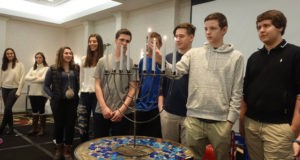What started as a one-year trial in 2003 thanks to grant funding has now become Volodarsky’s full-time job (albeit a part-time one). Volodarsky created the group Russian-American Jews in Minnesota (RAJMN) and now serves as the executive director. The organization falls under the auspices of the Jewish Federation of Greater St. Paul and has received additional funding from the Genesis Philanthropy Group, the Minneapolis Jewish Federation and Harry Kay. The St. Paul Federation started the group and from 2010 until last year it was run by the St. Paul Jewish Community Center. In the past 13 years, the group has grown to have put on more than 300 events, including a very successful Chanukah Celebration last month.
“[Coming over] is very different now because people don’t come as Jewish refugees,” she said. “With me, I came at 15, I went to Highland Park High School and spoke no English. I got a job at Camp Butwin right away as a junior counselor. Then I continued working at the JCC. I was able to fit in right away and it was nice for me to realize I was a part of a big Jewish community. I was very well received because I wanted to be. I made an effort. That’s how I continued being a part of the general Jewish community. Unfortunately, I was the only one who felt that way. All of my other peers stuck together away from the Jewish community. You have to have it within you.
“My story is my story and you can’t compare it to others’. I had the will to belong and I had a way to join the community. I was able to open up the project so that other Russian-Americans that did not have that sense of belonging could see the community with my eyes, from my perspective.”
Sasha Gerner has been involved in RAJMN since it began. He came to the U.S. as a 19-year-old in 1992, and was grateful that it started.
“There was not a lot of activities that united the Russian-Jewish community and, at the same time, the American-Jewish community wasn’t uniting us either,” he said. “We were looking to start something that would bring a lot of us together, educate us, and try to tie us together with American Jews.”
Volodarsky said a recent study puts the number of Minnesotans from the Former Soviet Union (FSU) at around 45,000 – although not all of those are Jews. She also said there is nothing special about Minnesota that brought people.
 “It’s a state and city where people can get jobs,” she said. “But in our case, the people who came in the 80s, 90s and early 2000s, it was for family reunions. They came to unite and because of the (Jewish) Federations. Used to take in refugees and resettle. That’s how most of us got here in the 80s and 90s. when there was no more refugee status, people could come unite with their families.”
“It’s a state and city where people can get jobs,” she said. “But in our case, the people who came in the 80s, 90s and early 2000s, it was for family reunions. They came to unite and because of the (Jewish) Federations. Used to take in refugees and resettle. That’s how most of us got here in the 80s and 90s. when there was no more refugee status, people could come unite with their families.”
Eli Skora, the executive director of the St. Paul Federation isn’t surprised by the success of RAJMN.
“We have the right person running it,” he said. “What most communities have done is try to impose their will on the Russian community.” RAJMN is now becoming a model for Federations. “She travels a lot. Change doesn’t come easy. People are wedded to what they think. These Russians are not easy to crack.”
Volodarsky is on the board of Limmud FSU, an organization which brings together and empowers young Jewish adults who are revitalizing Jewish communities and culture in the countries of the Former Soviet Union. She has worked to expand the project to teens and young adults, thanks in large part to the RAJMN Teen Fellowship.
The fellowship is a year-long program which starts each September. This year teens will make a documentary film with Russian-Jewish Holocaust survivors and WWII veterans, and they will have monthly guest speakers which will cover various Jewish topics, such as: Israel, the Holocaust, Jewish History, art, music and more. Fellowship participants also have the option of participating in the Limmud FSU conference in New York and lead workshops for teens and children. The meetings rotate monthly between St. Paul and Minneapolis.
“Most of the clients she’s serving come from Minneapolis,” Skora said. “The river doesn’t mean anything to them.”
Volodarsky said continued relevance is not easy to accomplish.
“So I always come up with something new and none of the programs repeat,” she said. “Russians are tough to work with: They’re all very opinionated and they aren’t afraid to speak their mind. And I say that in a nice way.”


1 comment